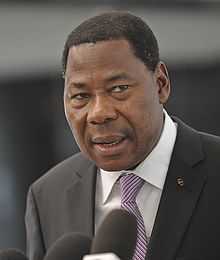Yayi Boni
| Yayi Boni | |
|---|---|
 | |
| President of Benin | |
| Incumbent | |
| Assumed office 6 April 2006 | |
| Prime Minister | Pascal Koupaki |
| Preceded by | Mathieu Kérékou |
| Chairperson of the African Union | |
| In office 29 January 2012 – 27 January 2013 | |
| Preceded by | Teodoro Obiang Nguema Mbasogo |
| Succeeded by | Hailemariam Desalegn |
| Personal details | |
| Born | Thomas Yayi Boni 1 July 1952 Tchaourou, Dahomey (now Benin) |
| Political party | Independent |
| Spouse(s) | Chantal Boni |
| Children | 5 |
| Alma mater | National University of Benin Cheikh Anta Diop University University of Orléans Paris Dauphine University |
| Religion | Evangelical |

Thomas Yayi Boni (born 1 July 1952) is a Beninese banker and politician who has been President of Benin since 6 April 2006. He took office after winning the March 2006 presidential election and was re-elected to a second term in March 2011. He also served as the Chairperson of the African Union from 29 January 2012 to 27 January 2013.
Biography
Boni was born in Tchaourou, in the Borgou Department in northern Benin, then the French colony of Dahomey. He was educated in the regional capital, Parakou, and later studied economics at the National University of Benin. He studied banking at Cheikh Anta Diop University in Dakar, Senegal, and later economics and politics at the University of Orléans in France and at Paris Dauphine University, where he completed a doctorate in economics in 1976.
From 1980 to 1988 Boni worked for the Central Bank of the States of West Africa (BCEAO), becoming its Deputy Director, based in Dakar. In 1988 he became Deputy Director for Professional Development at the West African Centre for Banking Studies, also in Dakar. From 1992 to 1994 he worked in the office of the President of Benin, Nicéphore Soglo, in charge of monetary and banking policy. Finally in 1994 he was appointed President of the West African Development Bank (BOAD). For his work on West African development he was appointed Chevalier de l'Ordre National de Mérite of the French Republic.
Boni stood as a candidate in the March 2006 presidential election. In the first round of voting, held on 5 March 2006, Boni polled 32 percent. His nearest challenger, Adrien Houngbédji of the Party for Democratic Renewal, polled 25 percent. Twenty-six candidates contested the election, which was reported to have been peaceful and fair. A runoff was held between Boni and Houngbédji on 19 March 2006; Boni won with almost 75 percent of the vote. He took office on 6 April 2006, succeeding Mathieu Kérékou.
Originally from a Muslim family,[1] Boni is now an Evangelical Protestant. He has five children, and his wife Chantal (née de Souza), a native of the coastal city of Ouidah, is the niece of the former President Paul-Émile de Souza and the great granddaughter of Francisco Felix de Sousa, also known as Chacha de Souza, who was a Brazilian slave trader and the Viceroy of Ouidah. A descendant of the Yoruba princes of Sabe in his own right, both Mr. Yayi Boni and his wife were awarded chieftaincy titles by the Nigerian king of Ile-Ife in 2008. [2]
Boni was reelected in 2011, taking 53.18 percent of the vote in the first round—enough to avoid a runoff election. He is the first president to win an election without a runoff since the restoration of democracy in 1991.
Assassination attempts

On 15 March 2007, Yayi Boni survived an ambush on his convoy near the village of Ikemon while returning from an election campaign rally in the town Ouesse for the upcoming parliamentary elections. The attackers blocked the road with downed trees, and fired upon the vehicle that usually carries the President; however President Boni was traveling in a separate vehicle. Several of his entourage were wounded in the ensuing crossfire between the presidential guard and the would-be assassins.[3] However this information remains unproven since all sources claiming the assassination attempt come from the president's camp. The verification of such information remains impossible to date.
On 23 October 2012, the BBC announced that the president's doctor, niece, and former commerce minister had been arrested in a plot to poison the president. A former ally of the president and businessman had reportedly paid the niece to substitute the President's medicine with a "toxic substance" while he was on a state visit to Brussels.[4]
See also
| Wikimedia Commons has media related to Yayi Boni. |
References
- ↑ "Yayi Boni is Benin's next President". Afrol.com.
- ↑ http://theooni.org/soko.htm
- ↑ "Shooting of the Presidential Convoy and attempted assassination of President Yayi Boni", Yayiboni.com, 16 March 2007.
- ↑ "BBC News – Benin President Boni Yayi 'poison plot': Three charged". Bbc.co.uk. 23 October 2012.
External links
- (French) Official site
- BBC News: Benin's new president announced
- President Bush Meets with President Yayi of Benin
| Political offices | ||
|---|---|---|
| Preceded by Mathieu Kérékou |
President of Benin 2006–present |
Incumbent |
| Diplomatic posts | ||
| Preceded by Teodoro Obiang Nguema Mbasogo |
Chairperson of the African Union 2012–2013 |
Succeeded by Hailemariam Desalegn |
| ||||||||
|